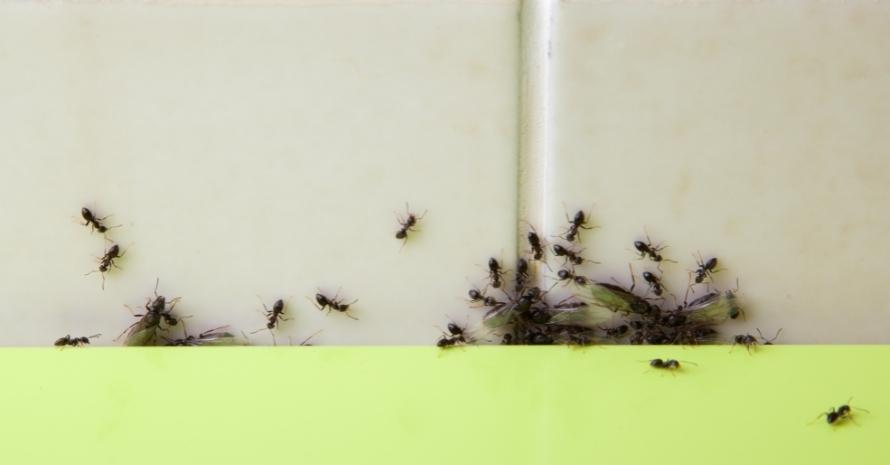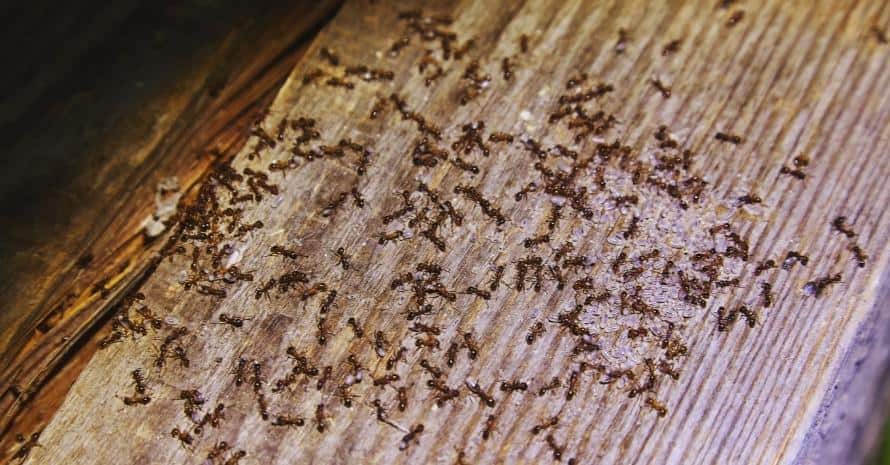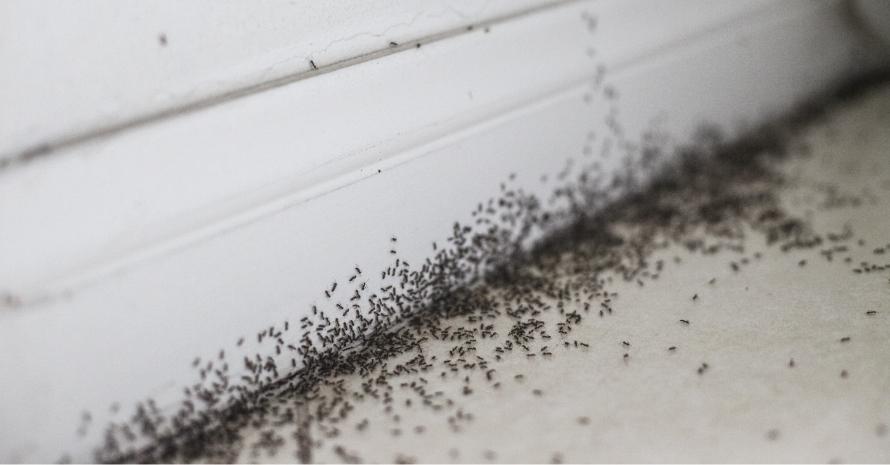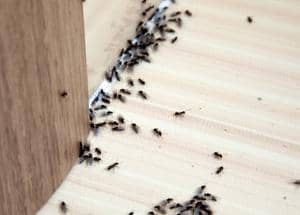It is certainly not a fun experience to notice some roommates in your house, especially if they are insects. How do ants get into your house?
This question may arise in the situation when those little creatures are already swarming the corners of your apartment. Fear not, as there are ways to show them who’s in charge.
What Attracts Them in Your House?
Why are ants in my house? This is probably your first thought when you notice black dots scurrying around the walls or floor. There are different reasons as to why you might have an ant infestation, but don’t worry because it sounds much scarier than it is actually is.
Usually, it depends on weather conditions, your habits of throwing food away, and the season of the year.
Insects are commonly active during warm periods like spring, summer, and early autumn. You might see a lot of them, especially in July and August. If ants are looking for water or a cool place to settle in, they can consider inspecting your house.
But most of the time, food is their main attraction. If you let a lot of plates, boxes, and cups stay out in the air, ants will try to get into your apartment in search of provision.
Their favorite parts are crumbs and sugar leftovers, so make sure to always wash your dishes. Of course, if you are living on the high floor, you might never encounter such a problem.

During rain seasons, their anthills might get flooded, so they take on an adventure to find a new place, and it might end up being your house. On the contrary, when there is high heat and drought, ants can be found in humid parts of the house, like the bathroom.
They settle in dark corners where it would be hard to see them, and they can operate during the night to avoid predators. Any food leftovers can be picked up and brought to the colony, and more workers will come there again to find more crumbs.
Ants are especially fond of sweet things, so please remember to properly store any sugar-containing products in your fridge or cupboards. If you have a pet, the nice thing would be to put their leftover food in the trash or outside.
Ants are natural explorers, and they can go out of their way to find provisions for their colony or a new place to settle. These small creatures are known to travel long ways from their homes in search of food. The one thing you need to pay attention to is if there is a colony’s queen in your house.
She is the center of the anthill, and if you find one in your building, it means that the whole swarm will come looking for her. She will produce pheromones, and if you don’t exterminate her fast enough, you might have to deal with the whole colony under your roof.
But How Do They Get There?
Unfortunately, there are quite some ways ants can get into your house. Where do ants come from? Well, to be honest, they might enter through anywhere, but don’t panic, because it is not so bad for you. Ants are nature’s cleaners that go out of their way to find the leftovers to feed their colony and leave for the next place.
The most common areas where you can find ants are in the corners of the room or on the walls. Where are ants coming from? First of all, you should check the cracks in the walls and flooring, as they can squeeze through pretty small spaces.
If your house is old and needs renovations, there might be gaps in the ways your floorboards are placed, or your walls have cracks in them due to deterioration. It is a good idea to inspect your apartment just to make sure that no ants can get in. You can put glue or filling foam where you suspect they might be coming from.
If you are still bothered with the question: “Where are ants coming from?” there might be another way for them to invade your house. You will need to check your foundation for any gaps, as ants can fit even between tiny cracks in concrete, and from there, they will find a way to your kitchen.
Make sure to always seal your food in plastic containers or keep it somewhere high so ants won’t have much access to there.

You are probably tired of asking: “How are ants getting in my house?” But patience is key because such infestation is actually pretty common. Remember that ants are not that harmful if you take the situation under control immediately.
They are nature’s helpers when it comes to cleaning different spaces, the biggest problem would appear if they decide to start a colony in your house. In some cases, they can get into your building through doors and windows, especially in summer when it is hot, and a lot of people keep them open for air circulation.
To prevent them from coming that way, you should put some strong chemicals on the brims, like bleach or vinegar, so ants will be opposed to entering the house that way. Of course, there is a chance of accidentally bringing them home from the streets on your coat or shoes. Don’t worry, as this way you’ve probably carried only one worker in, and when you take it outside, other ants won’t follow it.
How Do I Find Where Ants Are Coming From?
It is good to know how insects can get into the house, but where do ants come from? An easy method will help you investigate the trails they use to get into the building.
For that, you need to get a little saucer and pour there some droplets of honey or sugar water. With time, you will see the ants coming to feed on the mixture, then you should get a flashlight and follow one of them back to the original place of the ant nesting.
It might lead you outside, and that is actually good news because it means you won’t have to look through your floorboards and walls. Be sure not to lose the worker on its way, as ants are fairly small, and it might be hard to concentrate on it.
Ants usually love tight hidden places like cracks in the walls or floor, where there is enough space to accommodate the whole colony. In nature, anthills are located either underground or in old wood, where they all feed on the dying tree.
The most important part is to find the queen of the colony, as she is the key to getting rid of all of the ants. If you understand that the infestation is pretty huge, you should call pest control so the specialists handle your case.
While you are dealing with the ant problem, a helpful thing would be to put some vinegar or bleach on the trails they usually go through to your house. It will dissolve the pheromones workers leave behind for others to follow, so the remaining marching line will get confused and lost.
All in all, make sure to take the situation under control: if you see that ants don’t stop coming into your house, you should certainly contact your local pest service.
Please remember that applying insecticides might harm your house’s ecosystem, and they actually can be dangerous for humans if you breathe too much of their fumes.
Moreover, DIY methods while dealing with ants are not recommended, because you might ruin some parts of your home, and the problem just won’t go away that easily.
FAQ

Will ants eventually go away?
Ant problem in house is easily dealt with if you do every proper measure for them to lose interest in your building.
Does one ant mean there are more?
Since ants are social creatures, when one finds something interesting in your house, it will leave a trail for others to find the place.
Does killing ants attract more?
Yes, because the workers who go exploring will produce alarm pheromones that will give the other ants a sign to act and go find and help them.
Ants in the House Are Not Your Friends
How do ants get in your house? Now you know it and how to prevent such problems. There are a lot of ways to deal with them, but those little creatures won’t do you any harm if you understand how to properly get rid of them.
Ants are the great cleaners of nature, so help them do their business elsewhere.
How do you deal with ants in your house? What other insects have been a pain to handle? Please, share your opinion in the comments below.
Also read:
References
- A context-dependent alarm signal in the ant Temnothorax rugatulus(Journal of Experimental Biology)
https://www.researchgate.net/publication/263860018_A_context-dependent_alarm_signal_in_the_ant_Temnothorax_rugatulus - Indoor Ant Control(Pesticide Research Institute)
https://www.pesticideresearch.com/site/pri-resource-centers/pest-mgmt/pest-mgmt-bulletins/ant-control/ - Migration control: a distance compensation strategy in ants(National Library of Medicine)
https://pubmed.ncbi.nlm.nih.gov/27430995/

